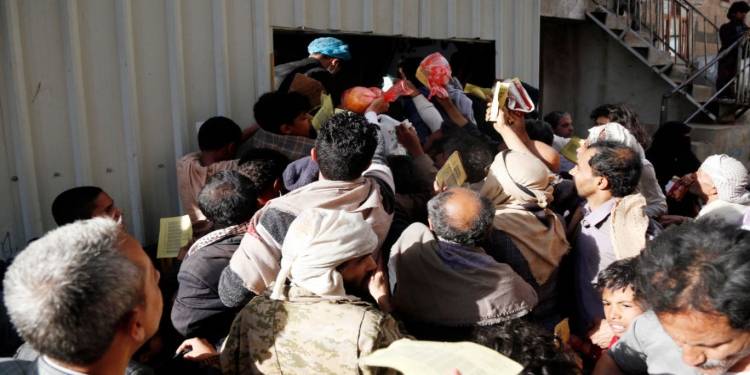
A stampede at a school in Yemen's capital Sanaa two days before the Eid-ul-Fitr festival claimed at least 78 lives, according to foreign media.
Hundreds of people crammed into a classroom in Sanaa's Bab al-Yemen neighborhood late on Wednesday, hoping to receive one of the $10 charitable donations that were being distributed by businesses to commemorate the end of Ramadan.
Houthi television shared a video of a crowded area on the messaging app Telegram, in which some people were shouting and screaming while others were reaching out to be pulled to safety. Security personnel tried to push people back and keep the mob under control.
Separate video from the capital-controlling Houthis showed bloodstains, shoes, and victims' clothing lying on the ground as investigators looked around.
The armed Houthis fired into the air in an attempt to contain the throng, hitting what appeared to be an electrical wire, which exploded and terrified those waiting, according to witnesses Abdel-Rahman Ahmed and Yahia Mohsen, who spoke to The Associated Press news agency.
Brig. Abdel-Khaleq al-Aghri, a spokesperson for the Houthi-run Ministry of Interior, called the occurrence "tragic" and blamed the "random distribution" of funding without consulting local authorities.
The ministry announced that the two merchants who organized the event had been detained and that an investigation was ongoing. The Houthis declared they would give each family that lost a relative roughly $2,000 in compensation, while the injured would get about $400.
According to hospital deputy director Hamdan Bagheri, at least 73 of the injured were transferred to the al-Thowra Hospital in Sanaa as families flocked to hospitals in search of their loved ones.
Mohammed al-Attab of Al Jazeera stated the disaster had "sparked nationwide anger" while reporting from Sanaa.
Since 2014, when the Houthis overthrew Yemen's internationally recognized government, Sanaa has been under their control.
A coalition led by Saudi Arabia intervened, as a result, a year later.
The battle has claimed the lives of more than 150,000 people, both fighters and civilians, and it has led to one of the biggest humanitarian catastrophes in history.
Hundreds of people crammed into a classroom in Sanaa's Bab al-Yemen neighborhood late on Wednesday, hoping to receive one of the $10 charitable donations that were being distributed by businesses to commemorate the end of Ramadan.
Houthi television shared a video of a crowded area on the messaging app Telegram, in which some people were shouting and screaming while others were reaching out to be pulled to safety. Security personnel tried to push people back and keep the mob under control.
Separate video from the capital-controlling Houthis showed bloodstains, shoes, and victims' clothing lying on the ground as investigators looked around.
The armed Houthis fired into the air in an attempt to contain the throng, hitting what appeared to be an electrical wire, which exploded and terrified those waiting, according to witnesses Abdel-Rahman Ahmed and Yahia Mohsen, who spoke to The Associated Press news agency.
Brig. Abdel-Khaleq al-Aghri, a spokesperson for the Houthi-run Ministry of Interior, called the occurrence "tragic" and blamed the "random distribution" of funding without consulting local authorities.
The ministry announced that the two merchants who organized the event had been detained and that an investigation was ongoing. The Houthis declared they would give each family that lost a relative roughly $2,000 in compensation, while the injured would get about $400.
According to hospital deputy director Hamdan Bagheri, at least 73 of the injured were transferred to the al-Thowra Hospital in Sanaa as families flocked to hospitals in search of their loved ones.
Mohammed al-Attab of Al Jazeera stated the disaster had "sparked nationwide anger" while reporting from Sanaa.
Since 2014, when the Houthis overthrew Yemen's internationally recognized government, Sanaa has been under their control.
A coalition led by Saudi Arabia intervened, as a result, a year later.
The battle has claimed the lives of more than 150,000 people, both fighters and civilians, and it has led to one of the biggest humanitarian catastrophes in history.

